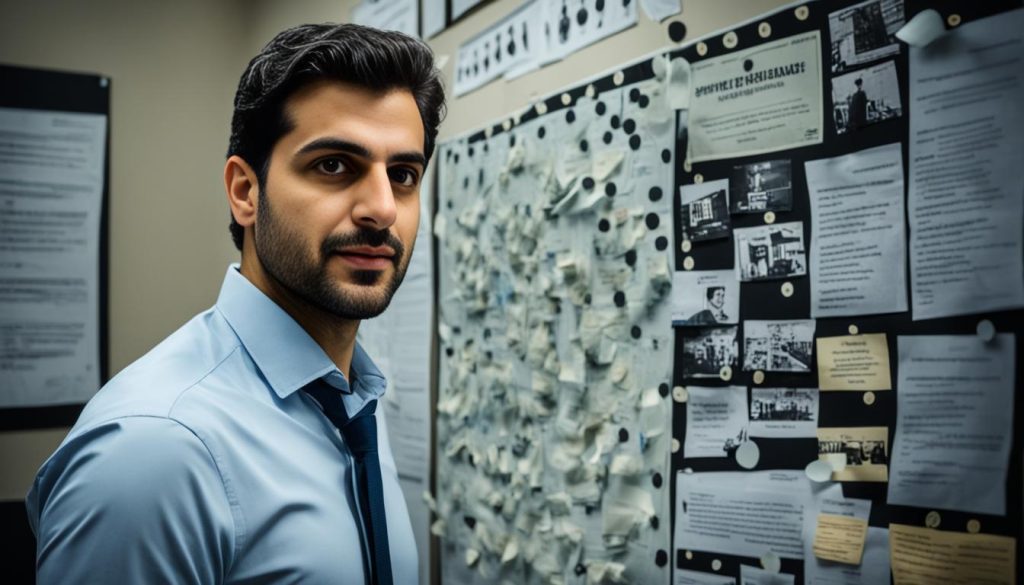Kamran Faridi Former FBI Agent: Uncovering His Journey

Kamran Faridi once worked for the FBI. He walked a fine line between danger and protection. His work in organized crime and against terrorists was not easy. Faridi faced tough choices that tested his ethics deeply. His story shows how people with checkered pasts can make a difference.
He was later sentenced to seven years in prison. The judge called his case extremely challenging. She recognized the vast help Faridi gave the country. But his actions were not without harm. After his time behind bars, Faridi is now out, having served his sentence.
As a former FBI agent, Faridi took on big roles. He helped bring down Islamic State terrorists and took on Russian gang leaders. He even went against his FBI bosses to save a special person. His career was full of ups and downs. It offers a unique look at the work of those in national security.
Key Takeaways
- Kamran Faridi’s life story transitions from a criminal past to a career as an undercover FBI agent, highlighting the complex dynamics between law enforcement and organized crime.
- Faridi’s operations targeted high-profile terrorist organizations and drug trafficking networks, showcasing his expertise as a counterterrorism expert.
- His work involved undercover operations that led to the arrest of key figures, including an Islamic State executioner, demonstrating his impact on national security.
- Faridi’s decision to protect a member of the Dawood Ibrahim cartel ultimately led to his downfall, raising ethical questions about the intelligence community and law enforcement’s relationship with criminal elements.
- Faridi’s story provides a behind-the-scenes insight into the challenges and personal journey of an individual navigating the boundaries between law and crime in the pursuit of the greater good.
Kamran Faridi’s Early Life: From Karachi Slums to Criminal Pursuits
Kamran Faridi began his journey in the Gulshan-e-Iqbal neighborhood, Karachi. Born and raised in Block 3, he was a bright student at the Ali Ali School. He joined the People’s Student Federation (PSF) in grade 9, aiming to make a change.
His path led him to connect with tough students from other schools, like the National College and NED University. He found a mentor in Najib Ahmed, a prominent figure in the PSF. This friendship opened new doors for Faridi.
The area was under the MQM’s control, often clashing with the People’s Party. Life became tough for Faridi in his neighborhood. With Najib’s help, he moved to Times Square. Here, he lived with fellow activists in an apartment.
Growing Up in Karachi’s Gulshan-e-Iqbal Neighborhood
Life in Karachi was not easy for Faridi. He was drawn into the complex world of political groups and crime. His involvement with the PSF and friendship with Najib Ahmed thrust him into local power struggles.
Involvement with Student Political Groups and Organized Crime
Faridi soon faced legal trouble, with warrants out for his arrest. The MQM was also a threat to him. In escaping these dangers, his parents arranged for his smuggling out of the country. They paid a large sum to a trafficker for this.
This led Faridi to Sweden, where new troubles awaited him. He became entangled with criminal networks there, leading to his arrest. The Swedish authorities took swift action against him for his criminal activities. Due to this, he faced deportation. Forced to flee once more, he found his way to the United States via Iceland.
Arriving in Atlanta, Georgia, in 1994, Faridi started over. He bought a gas station in a rough part of town. This was a bold move for someone with his past.
Recruitment by the FBI and Undercover Operations
Faridi got into a tricky situation with the Atlanta police. They wanted him to turn against Pakistani-Americans smuggling drugs. He somehow caught the FBI’s eye during this tough time. They recruited him because of his deep knowledge about Pakistan and his past as a criminal. This background made him a valuable asset for them.
Initial Encounter with Law Enforcement in Atlanta
Faridi’s journey into undercover work with the FBI was remarkable. He used his strong language skills in Urdu, Punjabi, Hindi, and Spanish. Additionally, his experience in the criminal world proved very useful.
Impressive Linguistic Skills and Criminal Background
The FBI was impressed with Faridi’s background and knowledge. They saw potential in his criminal past for their work. His diverse language skills and understanding of criminal activities greatly helped in his work with the FBI.
Kamran Faridi Former FBI Agent life story
Infiltrating Terrorist Organizations and Dismantling Operatives
Kamran Faridi, ever the undercover legend, used his language skills and past to get into terrorists’ groups. In November 2015, he went under the spotlight when Turkish investigators checked his Silivri villa after a tip-off. This tip led them to Aine Davis, from Britain, thought to be a member of a violent Islamic State group known as the Beatles. Faridi was deep in a role, pretending to be a wealthy man, chatting with an Islamic State supporter named Al-Walid Khalid Al-Agha.
Instrumental Role in the Arrest of Islamic State Executioner Aine Davis
Faridi’s secret work helped catch Aine Davis, a -significant member of Islamic State, and took out other big terrorists. The FBI sent him to Africa a few times in 2018 and to Southeast Asia in 2016 and 2019. In February 2019, thanks to Faridi, two al-Qaeda suspects were taken in in Malaysia. He played a big part in stopping Russian dealers from bringing drugs into the US, shining as a top agent in the FBI.
Operations in Africa and Southeast Asia Targeting Terrorist Affiliates
His fluency in languages like Urdu and Spanish made Faridi priceless for the FBI. He was sent to Africa and Southeast Asia to meet with possible terrorists. There, his work helped nab al-Qaeda suspects and break up drug lines feeding terrorist groups. Faridi’s assignments against terrorist affiliates showed his wide skills and success in counterterrorism.
The Dawood Ibrahim Connection and Betrayal
Faridi played a big part in getting Karachi businessman Jabir Motiwala arrested in London in 2018. The arrest happened because the United States asked for it. But after working for the FBI for years, Faridi changed his tune. He wouldn’t testify against Motiwala, a key player in the Indian crime group D-Company.
He changed his mind because he found out some startling news. Faridi learned that the FBI was working with India’s spy agency, the RAW. They wanted to connect Motiwala, D-Company, and Pakistan’s ISI. Faridi felt like he was set up by his own FBI friends.
Involvement in the Arrest of Jabir Motiwala
Faridi is also behind Motiwala’s arrest in London, back in August 2018. Motiwala was suspected to be working for the crime boss Dawood Ibrahim.
Refusal to Testify Against Motiwala and Alleged Framing
Despite helping arrest Motiwala, Faridi refused to testify against him. He claimed that the FBI and RAW set him up. They wanted to put a link between Motiwala, D-Company, and the ISI.
Faridi was upset with his FBI buddies for not telling him the full story.
Arrest and Extradition to the United States
In 2020, Faridi got arrested in London. This happened when FBI agents heard him talking to Motiwala’s lawyers. They found out Faridi planned to help Motiwala. Because of this, he was sent back to the United States and put in jail. They charged him with going against his FBI friends. A big mess for everyone involved.

Sentencing and Impending Deportation to Pakistan
Kamran Faridi, a former FBI agent, played a key role in capturing top Islamic State and Russian gang leaders. On December 9, 2022, he was given an 84-month jail term. He was sentenced because he didn’t testify against a member of the Dawood Ibrahim criminal group.
Even though Faridi helped the agency greatly, the judge had to follow the law. This made giving Faridi a prison term very hard for them.
Faridi’s jail time was lowered by one year due to a new law for first-time offenders. He behaved well in jail and made a deal with US authorities. The deal was that he would give up his US citizenship and go back to Pakistan before August of the following year.
His agreement included not appealing his sentence. Faridi is now getting ready to go back to his home country, Pakistan. Once there, he faces an uncertain future. This is because he ran from a criminal past in Karachi nearly 30 years ago.
The sentence and his upcoming return mark a challenging end to Faridi’s unusual story. It’s a tale that mixes law enforcement with organized crime, showing a complex situation.
The Challenges of Women Entrepreneurs in Pakistan
Women in Pakistan find it hard to get into business. Even though they’re nearly half the population, only 15 percent are professionals, and less than five percent are in business. This lack of representation and access to finance is a big issue, according to people at the ‘Shevolution’ business summit in Karachi. Officials say if women could join the economy equally, the country’s GDP would triple.
Lack of Representation and Access to Finance
There’s a big gap – women are 48 percent of the population, but only 20 percent work. The World Bank thinks if women worked like men, the country’s GDP could go up by 60 percent in four years. Clearly, helping women in business is a key to making the country’s economy stronger.
Need for More Women in Leadership Roles
At the Shevolution summit, people stressed the need for women in leadership roles. They want policies that help women and more chances for them to grow. They know the current support for women in business must improve.
Improving Ecosystem and Support from Government and Institutions
The SECP and financial groups are trying to help women in business, but more support is needed. With better rules, help, and advice, the growing number of women-owned businesses could help the country a lot. This is especially true for businesses that have done well during COVID-19.
Faridi’s Reluctance to Return to Karachi
Faridi lives in the US with his American wife. He feels going back to Pakistan could be “dangerous.” He escaped a life of crime there nearly 30 years ago. In a phone call from Florida, he told Arab News, “It will compromise my well-being, it’s going to be difficult.”
Speaking of Karachi, he said, “It’s going to be dangerous but what choices do I have?”
Safety Concerns and Potential Dangers
In the 1990s, Faridi was part of the MQM party and the PSF. Both groups were known for criminal deeds. After fleeing to Sweden, he got asylum almost three decades ago. Then, he moved to the United States.
Leaving Behind Life in the United States
After 30 years in the US, Faridi has made a life for himself, including a marriage. The idea of leaving all this and facing the past in Karachi is scary for him.
The Complex Web of Intelligence Operations
Faridi’s tale uncovers the complex mix of global intelligence missions. Here, the interests of national security meet the world of organized crime. His FBI colleagues shared details of a joint effort. This effort involved the FBI and India’s RAW. They were trying to link Jabir Motiwala and his D-Company with Pakistan’s ISI.
Joint Operations with Foreign Intelligence Agencies
Faridi wouldn’t testify against Motiwala, a top figure in a criminal group. This decision led to his troubles. In 2020, the FBI overheard Faridi talking to Motiwala’s lawyers. He planned to testify for Motiwala, which led to his arrest in London. He was later sent to the U.S., where he faced charges of threatening his ex-FBI colleagues.
Alleged Links Between D-Company, ISI, and RAW
This instance showcases the intricate nature of intelligence work. It shows possible links between criminal groups, spy agencies, and security needs. Faridi’s information hints at a complex relationship between the D-Company, ISI, and RAW. This reveals the tough ethical decisions that come in the intelligence world and international partnerships.

Faridi’s Transformation: From Gangster to Undercover Agent
Kamran Faridi’s life story is truly stunning. He went from being in the MQM party in Karachi to an undercover agent for the FBI. Before his FBI days, he lived a life mixed up in crime. But everything changed when he left for Sweden, and later found himself in the U.S.
In Atlanta, Georgia, everything started to change for Faridi. Law enforcement recognized his talents, seeing them as a benefit. He was particularly skilled in languages like Urdu and Spanish. Faridi then began his amazing journey as an undercover agent. He worked against terrorism both in the U.S. and abroad.
Faridi’s change from a gangster to an undercover agent was impressive. He used his knowledge of criminal networks to help the FBI. His work even led to catching big targets like an ISIS executioner and al-Qaeda members. This showed how much he helped keep the country safe.
Being an undercover agent is tough. It comes with many risks and tough choices. But Faridi never gave up on his mission. His story is a powerful example of how people can turn their lives around. It shows that even those with a dark past can make a bright future.
Lessons from Faridi’s Journey
Kamran Faridi’s journey shows how complicated it can be when lawmen deal with crime bosses. He changed his path from being part of criminal gangs in Karachi to helping the FBI as a secret agent. This shift highlights the tricky moral choices people in undercover work often face.
The Blurred Lines Between Law Enforcement and Organized Crime
Faridi’s story demonstrates the fine line that intelligence groups often walk when they join forces with criminals. The judge noted that while his actions greatly aided the country, they also brought significant harm. This case points out the crucial need for careful oversight and accountability in these types of operations.
The Ethical Dilemmas of Intelligence Gathering
Faridi’s path invites us to think about the moral questions that come with using criminal contacts for the greater good. His cooperation with the FBI, despite his past in criminal activities, exposes the ethical issues of such partnerships. It shows that distinguishing between proper police work and wrongful cooperation demands a deep ethical approach.
Faridi’s Legacy and Future Prospects
After almost 15 years, Kamran Faridi was sentenced to 84 months in jail. This happened in 2022 when he refused to testify against Jabir Motiwala. Motiwala is a key figure of the Dawood Ibrahim criminal group.
Faridi worked as an undercover agent, helping the FBI catch terrorists and criminals. But, his choice to not testify for Motiwala caused his arrest and upcoming deportation. This highlights the conflict between good results and ethical dilemmas in using criminals for intel.
With his return to Pakistan, Faridi’s legacy will be a topic of much debate. People will discuss the value of his work versus the moral issues it raises. His journey from criminal life to aiding the FBI is both impressive and troubling.
Faridi’s future is now filled with uncertainty. He is going back to a place he left long ago. His life, which changed from crime to helping stop it, is a story worth noting. It makes one think about the hidden side of fighting crime and the big role of rules in this.
FAQ
Who is Kamran Faridi?
Kamran Faridi was a top undercover FBI agent. He worked both in the U.S. and around the world. His job was to take down terrorist groups and criminal networks.
What was Faridi’s background before joining the FBI?
He grew up in Karachi and was part of groups involved in crime activities. Then, he fled to Sweden and later to the U.S.
How did Faridi become an FBI agent?
The Atlanta Police Department first met Faridi. Then, the FBI hired him because of his language skills and experience.
What were some of Faridi’s accomplishments as an FBI agent?
Faridi did amazing work as an undercover FBI agent. He helped catch many dangerous people, including a British man linked to ISIS.
What led to Faridi’s downfall and arrest?
After leaving the FBI, he wouldn’t help them with a case. He said they worked with another country to unfairly connect him to crimes. Faridi was caught in London in 2020 and sent back to the U.S. His former agency charged him.
What was Faridi’s sentence and current situation?
Faridi got 84 months in prison for not cooperating. He’s now going to be sent back to Pakistan under his agreement with the court.
What are the challenges faced by women entrepreneurs in Pakistan?
Many challenges bar women in Pakistan from business success. These include not enough women in leadership, little financial support, and the absence of policies to boost their impact.
Why is Faridi reluctant to return to Karachi, Pakistan?
Faridi thinks Karachi is too risky for him now. He fears for his safety because of his past connections with criminal groups there.
What is the complex web of intelligence operations that Faridi’s case highlights?
The case brings to light intense intelligence efforts, mixing crime groups, spy agencies, and security interests. It also raises questions about the choices made by intelligence groups when they work with criminals.











1 thought on “Kamran Faridi Former FBI Agent: Uncovering His Journey”